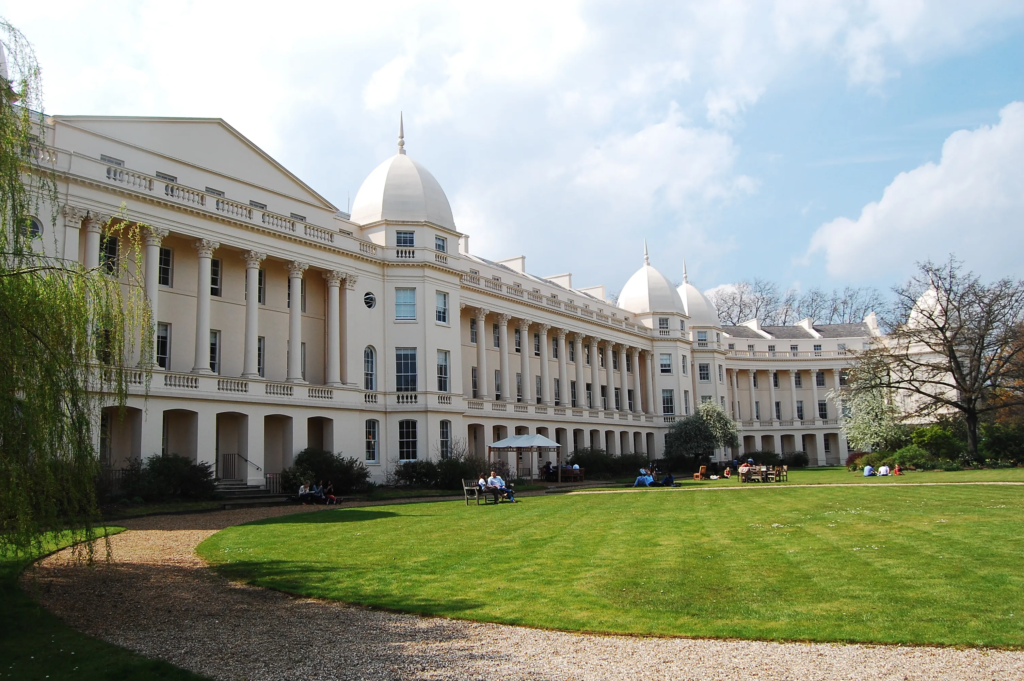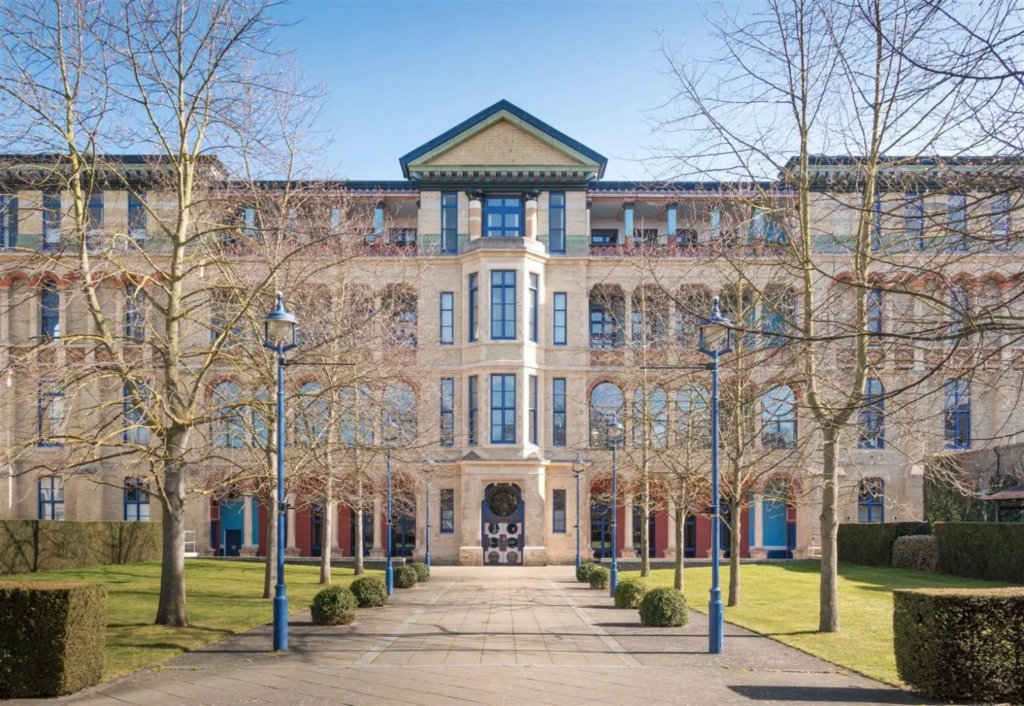The United Kingdom has long been a premier destination for students aspiring to pursue MBA. With its globally renowned business schools, culturally rich environment, and unmatched career opportunities, the UK offers a compelling case for anyone looking to advance their education and professional journey. Whether you’re seeking a one-year MBA for quicker ROI or the global networking opportunities these programs provide, this guide is designed to give you a comprehensive understanding of the best universities in UK for MBA.
- London Business School (LBS)
- University of Cambridge (Judge Business School)
- University of Oxford (Saïd Business School)
- Imperial College Business School
- Warwick Business School
- Durham University Business School
- Cranfield School of Management
- Alliance Manchester Business School
- University of Edinburgh Business School
- Lancaster University Management School
10 Best Universities in UK for MBA( fees, rankings and avg GMAT)
The UK is home to some of the world’s best business schools. Here’s a detailed look at the Best Universities in UK for MBA, their standout features, and why they are worth considering.
London Business School (LBS)
London Business School, located in the heart of London, is renowned for its diverse and dynamic MBA program. The school emphasizes a global perspective, with students from over 60 countries. LBS offers flexible program durations, allowing students to tailor their MBA experience. The curriculum focuses on leadership, strategy, and real-world application, preparing graduates for top-tier positions worldwide.

| Metric | Details |
|---|---|
| Global Ranking | Top 5 globally |
| Average GMAT Score | 708 |
| Tuition Fees | £109,700 |
| Additional Expenses | Approximately £30,000 (living expenses) |
| Notable Alumni | Sir James Ratcliffe (Founder, INEOS) |
| Average Post-MBA Salary | £85,374 |
University of Oxford – Saïd Business School
Saïd Business School, part of the historic University of Oxford, offers a rigorous one-year MBA program. The curriculum integrates academic excellence with practical application, emphasizing global challenges and responsible leadership. Students benefit from Oxford’s extensive resources and a diverse cohort, fostering a rich learning environment.

| Metric | Details |
|---|---|
| Global Ranking | Top 15 globally |
| Average GMAT Score | 690 |
| Tuition Fees | £71,440 |
| Additional Expenses | Approximately £15,000 (living expenses) |
| Notable Alumni | Roland Rudd (Founder, Finsbury) |
| Average Post-MBA Salary | £75,000 |
University of Cambridge – Judge Business School
Judge Business School offers a one-year MBA program known for its emphasis on innovation and entrepreneurship. Located within the University of Cambridge, the program provides access to a vast network of resources and a collaborative learning environment. The curriculum is designed to develop leadership skills and practical business knowledge.

| Metric | Details |
|---|---|
| Global Ranking | Top 20 globally |
| Average GMAT Score | 700 |
| Tuition Fees | £64,000 |
| Additional Expenses | Approximately £14,000 (living expenses) |
| Notable Alumni | Jason Gaverick Matheny (CEO, RAND Corporation) |
| Average Post-MBA Salary | £70,000 |
Imperial College Business School
Imperial College Business School, situated in London, offers a one-year MBA program with a strong focus on technology and innovation. The program integrates Imperial’s expertise in science and engineering, providing a unique perspective on business challenges. Students engage in projects that emphasize real-world application and leadership development.

| Metric | Details |
|---|---|
| Global Ranking | Top 25 globally |
| Average GMAT Score | 680 |
| Tuition Fees | £61,500 |
| Additional Expenses | Approximately £20,000 (living expenses) |
| Notable Alumni | Alice Gast (President, Imperial College London) |
| Average Post-MBA Salary | £65,000 |
Warwick Business School
Warwick Business School offers a one-year full-time MBA program known for its strong emphasis on leadership and strategic thinking. Located in Coventry, the school provides a collaborative learning environment with a diverse student body. The curriculum is designed to equip students with the skills needed to excel in a global business environment.

| Metric | Details |
|---|---|
| Global Ranking | Top 30 globally |
| Average GMAT Score | 660 |
| Tuition Fees | £45,950 |
| Additional Expenses | Approximately £13,000 (living expenses) |
| Notable Alumni | Andy Haldane (Chief Economist, Bank of England) |
| Average Post-MBA Salary | £62,000 |
These institutions offer robust MBA programs that cater to a variety of professional goals and interests. Prospective students should consider factors such as program structure, location, alumni network, and personal career objectives when selecting the right MBA program.
Is the UK Really Worth It? (Especially During Recession)
The global recession has created uncertainties across economies, but for ambitious students targeting top-tier universities, the UK remains a worthwhile investment. Here’s why:

1. Resilience of Top Universities
- Top universities like LBS, Oxford, and Cambridge maintain strong ties with global employers even during economic downturns.
- These schools provide career services, mentorship, and networking opportunities that ensure graduates land competitive roles despite market challenges.
2. ROI of a UK MBA
- While the cost of an MBA can be high, the average starting salary for graduates from schools like LBS and Oxford often exceeds £100,000, ensuring a high return on investment.
- For Indian students, this salary provides an excellent opportunity to recover costs within a few years post-graduation.
3. The UK’s Post-Study Work Policy
- The 2-year PSW permit adds immense value for international students, allowing them to gain work experience and build networks in the UK market.
4. Navigating Uncertainty
- Targeting top-tier universities helps mitigate risks associated with economic fluctuations. Their strong brand value ensures graduates remain highly employable across industries like consulting, technology, and finance.
5. Preparing for the Future
- A UK MBA equips students with skills to navigate global challenges, preparing them for leadership roles in dynamic environments.
QS Rankings of UK Colleges for MBA Programs [2024]
The QS World University Rankings are among the most trusted sources for evaluating the quality and reputation of business schools worldwide. For students considering an MBA in the UK, these rankings provide a clear picture of the top-performing institutions based on metrics like academic excellence, employer reputation, and alumni outcomes. Here is the list of the best MBA universities in the UK for 2024.

Top 10 MBA Universities in the UK and Their QS Rankings
- London Business School (LBS) – #1 in the UK, #5 globally.
- University of Cambridge (Judge Business School) – #2 in the UK, #10 globally.
- University of Oxford (Saïd Business School) – #3 in the UK, #12 globally.
- Imperial College Business School – #4 in the UK, #15 globally.
- Warwick Business School – #5 in the UK, #22 globally.
- Durham University Business School – #6 in the UK, #35 globally.
- Cranfield School of Management – #7 in the UK, #40 globally.
- Alliance Manchester Business School – #8 in the UK, #45 globally.
- University of Edinburgh Business School – #9 in the UK, #50 globally.
- Lancaster University Management School – #10 in the UK, #55 globally.
Comparing Best Universities in UK for MBA
When selecting an MBA program, it’s crucial to consider various factors such as tuition fees, program duration, average GMAT scores, and post-graduation salaries. Below is a detailed comparison of the top MBA programs in the UK to assist you in making an informed decision.
Program Comparison Table
| University | Program Duration | Tuition Fees | Average GMAT Score | Average Post-MBA Salary | Notable Alumni |
|---|---|---|---|---|---|
| London Business School (LBS) | 15-21 months | £109,700 | 708 | £85,374 | Sir James Ratcliffe (Founder, INEOS) |
| University of Oxford – Saïd | 1 year | £71,440 | 690 | £75,000 | Roland Rudd (Founder, Finsbury) |
| University of Cambridge – Judge | 1 year | £64,000 | 700 | £70,000 | Jason Gaverick Matheny (CEO, RAND Corp.) |
| Imperial College Business School | 1 year | £61,500 | 680 | £65,000 | Alice Gast (President, Imperial College) |
| Warwick Business School | 1 year | £45,950 | 660 | £62,000 | Andy Haldane (Chief Economist, Bank of England) |
How to Choose the Best Universities in UK for MBA

Choosing the right MBA program requires careful consideration of multiple factors to ensure it aligns with your career aspirations, financial situation, and long-term goals. Below is a detailed breakdown of the key factors to consider, along with supporting data to guide your decision.
Factors to Consider
1. Program Rankings and Reputation
- Why it Matters: A university’s ranking often reflects its academic quality, global reputation, and employability outcomes.
- Example: London Business School consistently ranks among the top 5 MBA programs globally, while Cambridge Judge and Oxford Saïd are also highly regarded.
| University | QS Global MBA Ranking (2024) | Employability Rank |
|---|---|---|
| London Business School (LBS) | 5 | 1 |
| University of Oxford – Saïd | 13 | 3 |
| University of Cambridge – Judge | 18 | 5 |
| Imperial College Business School | 21 | 7 |
| Warwick Business School | 27 | 9 |
2. ROI and Post-MBA Salaries
- Why it Matters: The return on investment (ROI) of an MBA program helps determine its value by comparing the cost of education to post-graduation earning potential.
- Data Insights: Graduates from LBS report an average salary of £85,374, significantly higher than the UK average salary of £38,000.
| University | Tuition Fees | Post-MBA Salary | ROI (Years) |
|---|---|---|---|
| London Business School (LBS) | £109,700 | £85,374 | ~2 |
| University of Oxford – Saïd | £71,440 | £75,000 | ~1 |
| University of Cambridge – Judge | £64,000 | £70,000 | ~1 |
| Imperial College Business School | £61,500 | £65,000 | ~1 |
| Warwick Business School | £45,950 | £62,000 | ~1 |
3. Program Structure and Duration
- Why it Matters: Most UK MBA programs are 1-year, offering quicker entry into the workforce, whereas programs like LBS offer flexible durations for in-depth learning.
- Additional Data:
- LBS offers electives like “Global Strategy” and “Digital Business,” attracting professionals in leadership roles.
- Cambridge emphasizes innovation, aligning with tech entrepreneurs.
4. Alumni Network
- Why it Matters: A strong alumni network can open doors to mentorship, networking, and job opportunities.
- Notable Alumni Examples:
- LBS: Sir James Ratcliffe (Founder, INEOS).
- Oxford Saïd: Roland Rudd (Founder, Finsbury).
5. Location and Lifestyle
- Why it Matters: Proximity to business hubs like London can influence networking, internships, and job opportunities.
- Cost of Living:
- London: Approx. £2,000/month for rent and utilities.
- Outside London: Approx. £1,200/month.
| City | Average Monthly Cost (Living) |
|---|---|
| London | £2,000 |
| Oxford | £1,500 |
| Cambridge | £1,500 |
| Coventry (Warwick Business School) | £1,200 |
Admission Requirements for UK MBA Programs
Applying to an MBA program in the UK involves meeting specific academic, professional, and language requirements. Here’s a detailed breakdown of the common admission criteria across top universities, along with supporting data to help you prepare.
General Admission Criteria
| Requirement | Details |
|---|---|
| Bachelor’s Degree | A recognized undergraduate degree with a strong academic record. |
| Work Experience | 2-5 years of professional experience (varies by program). |
| GMAT/GRE Scores | Competitive scores required (average GMAT: 650-708). |
| English Proficiency | IELTS: 7.0 overall / TOEFL: 100 (minimum scores vary by university). |
| Essays/Personal Statement | Strong essays highlighting career goals, leadership experiences, and fit. |
| Letters of Recommendation | Typically 2, from professional or academic referees. |
| Interview | By invitation, focusing on leadership potential and motivations. |
Tips to Strengthen Your Application
- Ace the GMAT/GRE: Aim for a score above the program average to increase your competitiveness.
- Craft Exceptional Essays: Highlight unique professional experiences and clear career goals.
- Secure Strong Recommendations: Choose referees who can provide specific examples of your leadership and impact.
- Prepare for the Interview: Practice articulating your motivations, career aspirations, and fit for the program.
- Showcase International Exposure: If applicable, highlight work experience or projects involving global teams.
MBA fees for Top UK Colleges

Understanding the financial commitment of pursuing an MBA in the UK is crucial for prospective students. This section provides a comprehensive breakdown of tuition fees, living expenses, and available scholarships for top MBA programs in the UK.
Tuition Fees
| University | Program Duration | Tuition Fees | Additional Costs |
|---|---|---|---|
| London Business School (LBS) | 15-21 months | £109,700 | Program materials: £5,000 |
| University of Oxford – Saïd | 1 year | £71,440 | N/A |
| University of Cambridge – Judge | 1 year | £64,000 | College fee: £3,000 |
| Imperial College Business School | 1 year | £61,500 | N/A |
| Warwick Business School | 1 year | £45,950 | N/A |
Living Expenses
Living expenses in the UK vary based on the city and lifestyle preferences. London, as a global hub, is generally more expensive than cities like Coventry or Oxford.
| City | Estimated Monthly Living Costs | Annual Cost |
|---|---|---|
| London | £2,000 | £24,000 |
| Oxford | £1,500 | £18,000 |
| Cambridge | £1,500 | £18,000 |
| Coventry (Warwick) | £1,200 | £14,400 |
Scholarships and Financial Aid
Scholarships can significantly reduce the financial burden of studying an MBA in the UK. Here are some notable scholarships offered by top universities:
| University | Scholarship Name | Value | Eligibility Criteria |
|---|---|---|---|
| London Business School (LBS) | Merit Scholarship | Up to £50,000 | Based on academic and professional excellence |
| University of Oxford – Saïd | Skoll Scholarship | Full tuition + £8,000 | For candidates focusing on social innovation |
| University of Cambridge – Judge | Cambridge Trust Scholarships | Variable | Based on merit and financial need |
| Imperial College Business School | Imperial Women’s Scholarships | Up to £25,000 | Female candidates demonstrating leadership |
| Warwick Business School | Global Excellence Scholarships | Up to 50% tuition fees | Academic and professional excellence |
Additional Financial Considerations
- Health Insurance: Approximately £500/year as part of the Immigration Health Surcharge (IHS).
- Visa Fees: The UK student visa costs around £363.
- Textbooks and Materials: These vary by program, typically ranging between £500-£1,000 annually.
- Part-Time Work: Students on a Tier 4 visa can work up to 20 hours per week during term time, potentially earning up to £800/month.
Tips to Manage Costs
- Apply Early for Scholarships: Many universities offer early application discounts or merit scholarships.
- Explore External Scholarships: Organizations like Chevening and Commonwealth Scholarships provide funding for Indian students.
- Budget Wisely: Track expenses using budgeting apps to avoid overspending.
- Utilize Part-Time Work Opportunities: Earn extra income while gaining local work experience.
Post-MBA Career Opportunities

The primary motivation for pursuing an MBA often revolves around enhanced career prospects. Graduates from UK MBA programs consistently achieve high employment rates, competitive salaries, and placement in top global firms. This section provides an overview of post-MBA career opportunities, including industry preferences, average salaries, and notable recruiters.
Employment Statistics
| University | Employment Rate (3 Months Post-Graduation) | Average Salary (£) | Top Employers |
|---|---|---|---|
| London Business School (LBS) | 93% | £85,374 | McKinsey, BCG, Goldman Sachs |
| University of Oxford – Saïd | 91% | £75,000 | Amazon, Deloitte, HSBC |
| University of Cambridge – Judge | 90% | £70,000 | Google, PwC, Microsoft |
| Imperial College Business School | 89% | £65,000 | Bain, JP Morgan, Shell |
| Warwick Business School | 85% | £62,000 | Accenture, EY, Barclays |
Top Hiring Industries
Graduates from UK MBA programs enter diverse industries, leveraging their specialized skills and business acumen. Below is an overview of the most popular sectors.
| Industry | Percentage of Graduates | Average Salary (£) | Top Employers |
|---|---|---|---|
| Consulting | 33% | £85,000 | McKinsey, BCG, Bain |
| Financial Services | 25% | £80,000 | Goldman Sachs, JP Morgan, Barclays |
| Technology | 20% | £75,000 | Amazon, Google, Microsoft |
| Healthcare/Pharma | 12% | £70,000 | GSK, Roche, AstraZeneca |
| Energy | 10% | £68,000 | Shell, BP, Total |
Career Development Support
All top UK MBA programs provide robust career development services to help students secure roles that align with their ambitions.
| Service | Details |
|---|---|
| Dedicated Career Coaches | Personalized support for resume building, interview preparation, and job search strategies. |
| Recruitment Events | Regular networking events with industry leaders and potential employers. |
| Internship Opportunities | Access to internships for hands-on experience, often leading to full-time roles. |
| Alumni Mentorship Programs | Pairing students with alumni to provide guidance and networking opportunities. |
Notable Alumni Success Stories
| University | Alumni Name | Current Role | Industry |
|---|---|---|---|
| London Business School (LBS) | Sir James Ratcliffe | Founder & CEO, INEOS | Chemical/Manufacturing |
| University of Oxford – Saïd | Tony Wheeler | Founder, Lonely Planet | Publishing |
| University of Cambridge – Judge | Jason Matheny | CEO, RAND Corporation | Research/Policy |
| Imperial College Business School | Alice Gast | President, Imperial College London | Education |
| Warwick Business School | Andy Haldane | Chief Economist, Bank of England | Finance |
Post-MBA Salary Growth
| University | Pre-MBA Average Salary (£) | Post-MBA Average Salary (£) | Salary Growth (%) |
|---|---|---|---|
| London Business School (LBS) | £40,000 | £85,374 | 113% |
| University of Oxford – Saïd | £35,000 | £75,000 | 114% |
| University of Cambridge – Judge | £33,000 | £70,000 | 112% |
| Imperial College Business School | £32,000 | £65,000 | 103% |
| Warwick Business School | £30,000 | £62,000 | 107% |
Top Tips for Maximizing Career Opportunities Post-MBA
- Engage with Career Services Early: Utilize career workshops and one-on-one coaching as soon as you begin your program.
- Build Your Network: Attend alumni events, join professional organizations, and connect with peers.
- Tailor Your Internship: Choose internships aligned with your career goals to gain relevant experience.
- Highlight Transferable Skills: Focus on leadership, strategic thinking, and problem-solving abilities in job applications.
- Leverage University Brand: Showcase the prestige and global reach of your MBA program in interviews and networking events.
Conclusion
An MBA from a Best Universities in UK for MBA can be a transformative step in your career. With globally ranked programs, unparalleled networking opportunities, and competitive post-graduation salaries, the UK remains a premier destination for ambitious professionals. Whether you aspire to excel in consulting, finance, or technology, UK MBA programs provide the resources, knowledge, and networks to achieve your goals. However, choosing the right program is critical to maximizing your return on investment. By understanding your career objectives, financial constraints, and personal preferences, you can make an informed decision that aligns with your ambitions.




